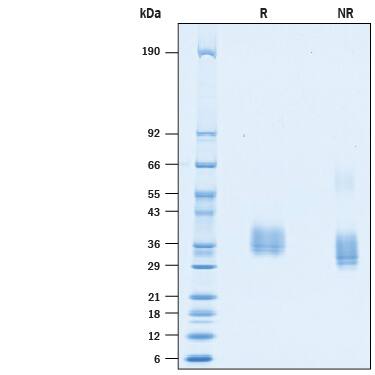Recombinant SARS-CoV-2 Spike RBD His-tag Protein, CF
R&D Systems, part of Bio-Techne | Catalog # 10534-CV
Mammalian CHO Cell Expressed, High ACE-2 Binding

Key Product Details
Product Specifications
Source
Chinese Hamster Ovary cell line, CHO-derived sars-cov-2 Spike RBD protein
Arg319-Phe541, with a C-terminal 6-His tag
Arg319-Phe541, with a C-terminal 6-His tag
Purity
>95%, by SDS-PAGE visualized with Silver Staining and quantitative densitometry by Coomassie® Blue Staining.
Endotoxin Level
<0.10 EU per 1 μg of the protein by the LAL method.
N-terminal Sequence Analysis
Arg319
Predicted Molecular Mass
26 kDa
SDS-PAGE
32-40 kDa, under reducing conditions
Activity
Measured by its binding ability in a functional ELISA with Recombinant
Human ACE-2 His-tag
(Catalog #
933-ZN).
Scientific Data Images for Recombinant SARS-CoV-2 Spike RBD His-tag Protein, CF
Recombinant SARS-CoV-2 Spike RBD His-tag Protein SDS-PAGE
2 μg/lane of Recombinant SARS-CoV-2 Spike RBD His-tag (CHO Expressed) (10534-CV) was resolved with SDS-PAGE under reducing (R) and non-reducing (NR) conditions and visualized by Coomassie® Blue staining, showing bands at 32-40 kDa and 28-35 kDa, respectively.Binding of ACE-2 to SARS-CoV-2 Spike RBD by surface plasmon resonance (SPR).
Binding of ACE-2 to SARS-CoV-2 Spike RBD by surface plasmon resonance (SPR). Recombinant SARS-CoV-2 Spike RBD His-tag Protein (Catalog # 10534-CV) was immobilized on a Biacore Sensor Chip CM5, and binding to recombinant human ACE-2 (Catalog # 933-ZN) was measured at a concentration range between 0.37 nM and 93.5 nM. The double-referenced sensorgram was fit to a 1:1 binding model to determine the binding kinetics and affinity, with an affinity constant of KD=1.722 nM.Formulation, Preparation and Storage
10534-CV
| Formulation | Lyophilized from a 0.2 μm filtered solution in PBS with Trehalose. |
| Reconstitution | Reconstitute at 500 μg/mL in PBS. |
| Shipping | The product is shipped at ambient temperature. Upon receipt, store it immediately at the temperature recommended below. |
| Stability & Storage | Use a manual defrost freezer and avoid repeated freeze-thaw cycles.
|
Background: Spike RBD
References
- Wu, F. et al. (2020) Nature 579:265.
- Tortorici, M.A. and D. Veesler (2019). Adv. Virus Res. 105:93.
- Bosch, B.J. et al. (2003). J. Virol. 77:8801.
- Belouzard, S. et al. (2009) Proc. Natl. Acad. Sci. 106:5871.
- Millet, J.K. and G. R. Whittaker (2015) Virus Res. 202:120.
- Yuan, Y. et al. (2017) Nat. Commun. 8:15092.
- Walls, A.C. et al. (2010) Cell 180:281.
- Jiang, S. et al. (2020) Trends. Immunol. https://doi.org/10.1016/j.it.2020.03.007.
- Ortega, J.T. et al. (2020) EXCLI J. 19:410.
- Wrapp, D. et al. (2020) Science 367:1260.
- Tai, W. et al. (2020) Cell. Mol. Immunol. https://doi.org/10.1016/j.it.2020.03.007.
- Okba, N. M. A. et al. (2020). Emerg. Infect. Dis. https://doi.org/10.3201/eid2607.200841.
- Wang, X. et al. (2020) https://doi.org/10.1038/s41423-020-0424-9.
- Wang, K. et al. (2020) bioRxiv https://www.biorxiv.org/content/10.1101/2020.03.14.988345v1.
Long Name
Spike Receptor Binding Domain
Gene Symbol
S
UniProt
Additional Spike RBD Products
Product Documents for Recombinant SARS-CoV-2 Spike RBD His-tag Protein, CF
Product Specific Notices for Recombinant SARS-CoV-2 Spike RBD His-tag Protein, CF
For research use only
